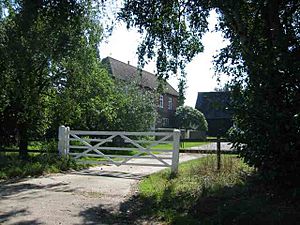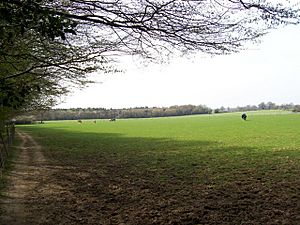Walter of Bibbesworth facts for kids
Walter of Bibbesworth (born around 1235, died around 1270) was an English knight and a poet who wrote in Anglo-Norman French. This was a type of French spoken in England after the Norman Conquest. Records show that Walter owned land in a place called Kimpton, Hertfordshire, at a farm now known as Bibbsworth Hall.
Around 1250, Walter served in Gascony (a region in France) as part of King Henry III's army. He was under the command of a leader named Nicholas de Molis. Walter is also thought to have joined the Ninth Crusade in 1270 or 1271. This idea comes from a special kind of poem called a tençon, which is like a poetic argument. In this poem, Walter teases another knight, Henry de Lacy, for staying home instead of going on the Crusade. Walter did go and later returned. He was buried in Essex during the early reign of King Edward I.
Contents
Walter's Famous Writings
Walter of Bibbesworth is most famous for a long poem called Le Tretiz, which means "The Treatise." This poem was written in medieval French verse. What makes it special is that it had Middle English notes written between the lines. These notes helped people understand the French words.
Why "The Treatise" Was Written
The Treatise was created to help children learn French. One version of the poem has a note saying it was written for a lady named Madame Dyonise de Mountechensi. She wanted to teach her children French, and Walter's poem was a great tool for that.
Popularity of "The Treatise"
The poem became very popular. Later, it was even included in a French textbook from the Middle Ages called Femina Nova. This shows how useful and well-known Walter's work was for teaching French during that time.
Other Poems by Walter
Walter is also believed to have written a few other shorter poems in medieval French. One of these poems praised beauty, and another was about the Virgin Mary. However, some experts think the poem about beauty might have been written by someone else, Nicole Bozon.
List of Walter's Works
- Le Tretiz ("The Treatise")
- "De bone femme la bounté" (This one might not be by him)
- "Amours m'ount si enchaunté"
- "La Pleinte"
 | Sharif Bey |
 | Hale Woodruff |
 | Richmond Barthé |
 | Purvis Young |



